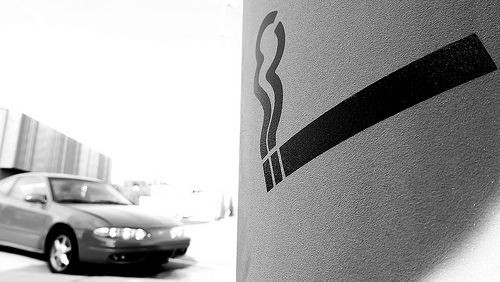Should Smoking Be Banned In Cars With Kids Present? US And Britain Show Support For New Policy

Effective by May 2015, the British government will make it illegal for parents to smoke in the car while carrying children. While controversial for those who consider the move further encroachment on personal freedoms, a growing number of people, both across the pond and stateside in the U.S., are beginning to cozy up to the idea, recent research contends.
Cigarette smoking carries no federal ban in the United States, though all but 14 states have enacted some form of a statewide ban. Currently, 81.5 percent of the population is protected by at least one ban — either in bars, restaurants, or non-hospitality workplaces — and 49.1 percent is protected by all three. Smoking is decidedly on the way out, and experts suggest the national rate could drop as low as five percent in the next few decades. But these trends all reflect public policy. What about private policy?
One of the loudest criticisms of indoor smoking bans in private residences is the infringement of privacy — a “Who are you to tell me?” attitude that holds water on an individual level but begins to leak when younger bodies are in the other room or backseat. "Smoke is a real health hazard for kids whose lungs are still developing," said Dr. Matthew Davis, the director of a July 2013 poll at the University of Michigan, in a university release, “and especially for kids who have illnesses like asthma where the lungs are particularly fragile and flare up when exposed to secondhand smoke."
Davis and his colleagues found that 82 percent of American adults favor a smoking ban in cars when a child under the age of 13 was also in the car. They also found 87 percent of respondents support a ban on smoking in businesses where children are allowed, and 75 percent for nonsmoking in homes with asthmatic children. Perhaps most surprising, though, was the fact 60 percent of smokers agreed to a ban on smoking in cars carrying children.
A wealth of data over the years has shown the effects of secondhand smoke and household smoking on children. Of cigarette smoking’s 480,000 annual deaths, nearly 42,000 of those are the result of secondhand smoke. What’s more, children whose parents smoke are twice as likely to begin smoking. Advocates of a smoking ban in cars argue that, even with the windows down, the naturally cramped space increases a child’s risk of exposure.
"The intention is for the secondary regulations to be in force ahead of May 2015," Prime Minister David Cameron's official spokesman said on Tuesday, according to Reuters. "There is a particular issue around vehicles being a particularly confined space and the associated public health concerns."
The greater upshot to such a ban is that smoking is becoming increasingly less convenient. Where even doctors once smoked bedside, the smoking public is running out of places to maintain their habit while out and about. So even if people don’t quit for the ideal health-related reasons, the fact they’re quitting is, by most measures, enough.
“The level of public support for ways to reduce children's exposure to secondhand smoke is so high,” Davis said, “that now may be the time to for public health officials and legislators to move forward on ideas like these to protect children's health.”



























